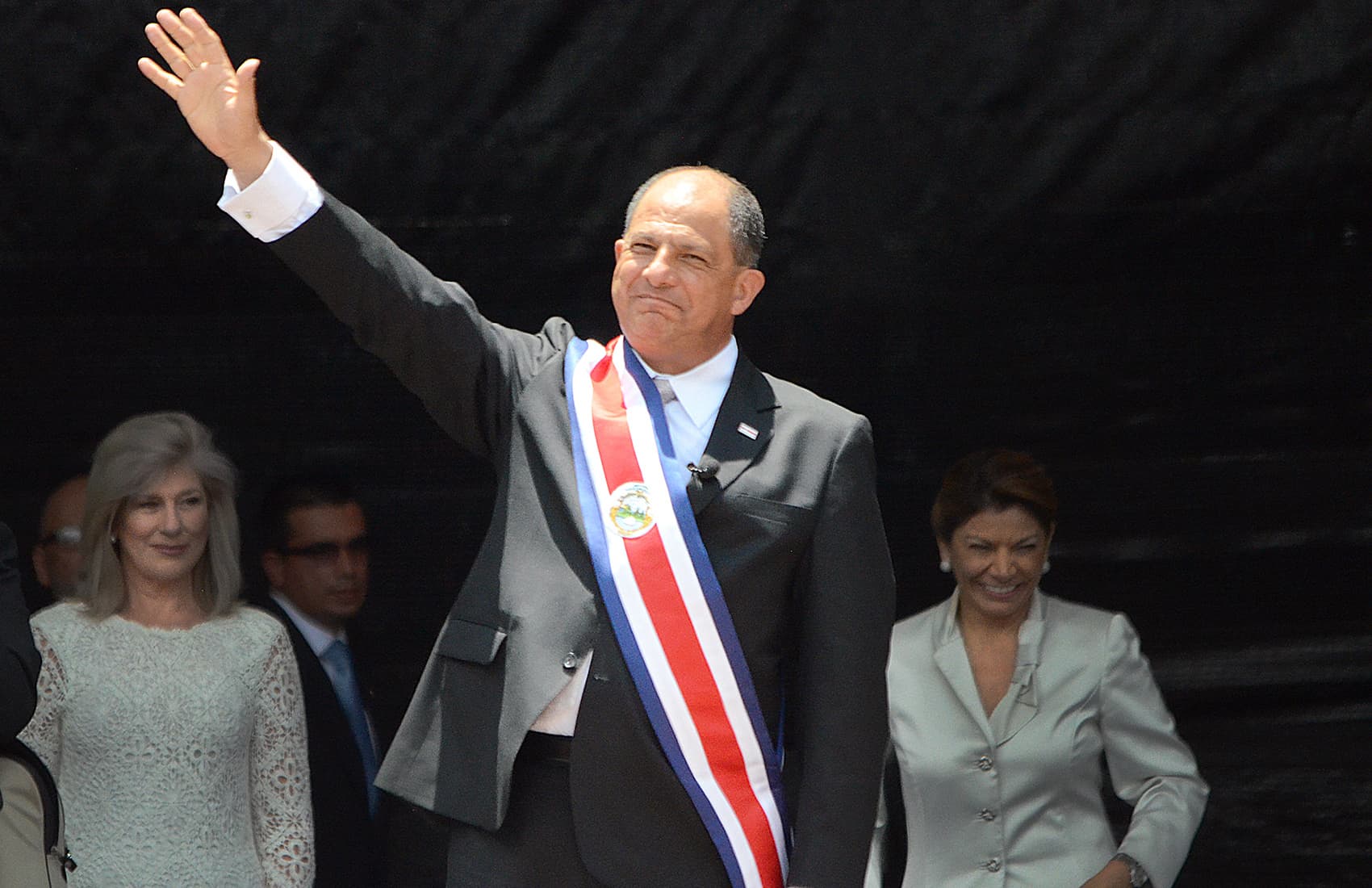Historian and political scientist Luis Guillermo Solís on Thursday became the 47th president of Costa Rica amid high expectations for change from voters who want corruption rooted out of politics and more policies to reduce social inequality.
Solís, 56, accepted the tricolor presidential sash from 46th President Laura Chinchilla just before noon at San José’s National Stadium. Leaders and dignitaries from 80 nations attended the ceremony, including the presidents of Bolivia, Ecuador, Guatemala, Honduras, Panama and the Dominican Republic, the president-elect of El Salvador, the vice president of Venezuela and Prince Felipe de Borbón.
Dressed in a dark suit, Solís, who attended the inauguration ceremony with his partner, First Lady Mercedes Peñas Domingo (the two are not married), and his father, swore to uphold the constitution as president while thousands of Costa Ricans delivered a standing ovation, chanting, “Sí se pudo, sí se pudo,” “Yes, we could!”
“People have bet on change. They have great hopes and expectations that we should know how to govern,” Henry Mora, the new president of the Legislative Assembly, said during a speech to mark the event.
Relatively unknown by Costa Rican voters just over a year ago, Solís became president with an astounding 78 percent of the vote in an April 6 runoff against former San José mayor Johnny Araya. Solís promised a more balanced development for Costa Rica’s 4.5 million citizens, and a strengthening of one of Latin America’s oldest democracies.
“I’m thrilled to participate in this democratic celebration, this historical day. We’ve been waiting for change for years,” said Ana Cordero, who attended the free inauguration ceremonies under a hot Thursday morning sun.
For the first time in nearly 60 years, a non-traditional party – the Citizen Action Party, or PAC – will occupy Casa Presidencial. PAC emerged 13 years ago with the goal of breaking Costa Rica’s two-party political system dominated by the National Liberation Party and the Social Christian Unity Party.
Taking care of business
Proud of their achievements in public health and education, Costa Ricans are resentful over a deterioration in social gains in recent years, and they are quick to complain about the increasing cost of living, corruption and a widening gap between the rich and poor.
“People want transparency and new opportunities. Past administrations have done nothing but pass el ‘churuco’ [the buck] to the next administration, with expensive basic goods and a social security system in crisis. We want this to change,” Xinia Pérez, 52, said.
The outgoing Chinchilla administration was plagued by scandals and a deteriorating public image. She also inherited a country with infrastructure problems, an internal debt of 60 percent of gross domestic product, and a fiscal deficit of 6 percent.
“We can’t continue business as usual. We need clear fiscal rules, and it has to be a priority,” economist Alberto Franco said.
Recommended: Timeline of the Chinchilla administration’s scandals
Solís has promised a more “honest” politics and to jumpstart the economy. He also promised to reduce inequality and poverty, which has remained stagnant at 20 percent of the population for two decades. He also vowed to eradicate extreme poverty – which affects 6 percent of the population – through job-creation and social programs.
“I hope he doesn’t let us down. He seems to know what the country needs: jobs for young people, infrastructure, social security. And if he’s going to raise taxes, it shouldn’t be to hurt the middle class and the poor,” said Beatriz Rojas, a 29-year-old entrepreneur.
Even with the devil, if needed
Solís’ critics say his economic plans are ambiguous. His administration, announced in recent weeks, is composed of several academics without experience in public office. And they’re about to “test their capabilities,” political analyst Constantino Urcuyo said.
“It’s not a Cabinet composed of campaign volunteers,” Solís said, alluding to traditional politics and the trend of awarding political favors with government posts.
Solís and his party will face a politically fragmented Legislative Assembly, in which the former ruling PLN has 18 lawmakers of a total of 57. PAC, which won the legislative directorate on May 1, has 13 lawmakers.
“There’s no other choice but to negotiate, even with the devil, but only when it doesn’t compromise principles. People will understand this as long as those negotiations are conducted openly,” sociologist Manuel Rojas said.
A foreign policy expert, Solís will face ongoing tensions with Costa Rica’s neighbor to the north, Nicaragua, over a border dispute. Nicaraguan President Daniel Ortega was the only Central American leader not personally invited by Solís during a recent trip. Solís also will head the presidency pro-tempore of the Community of Latin American and Caribbean States.
Recommended: Winning on the cheap: Solís campaign spent a quarter of what Araya spent in the last election

